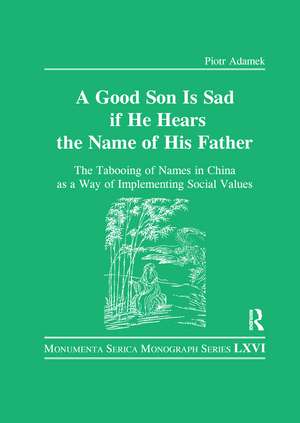Good Son is Sad If He Hears the Name of His Father: The Tabooing of Names in China as a Way of Implementing Social Values: Monumenta Serica Monograph Series
Autor Piotr Adameken Limba Engleză Paperback – 30 iun 2020
It is surprising what an enormous impact the tabooing of names (bihui 避諱) had on Chinese culture. The names of sovereigns, ancestors, officials, teachers, and even friends were all considered taboo, in other words it was prohibited to pronounce them or to record them in writing. In numerous cases characters identical or similar in writing or pronunciation were often avoided as well. The tabooing of names was observed in the family and on the street, in the office and in the emperor’s palace. The practice of bihui had serious consequences for the daily lives of the Chinese and for Chinese historiography. People even avoided certain places and things, and refused to accept offices. They were punished and sometimes even killed in connection with the tabooing of names. The bihui custom existed as an important element of Chinese culture and was perceived as significant by Chinese and foreigners alike. It was crucial for implementing social values and demonstrating the political hierarchy.
The present work A Good Son Is Sad if He Hears the Name of His Father is a systematic study of Chinese name-tabooing customs, which until now have been relatively little explored in Western-language Sinological studies. It attempts to provide a long-term perspective on the changing dynamics of tabooing and elucidates various aspects related to the fascinating topic of tabooing of names.
Din seria Monumenta Serica Monograph Series
-
 Preț: 239.06 lei
Preț: 239.06 lei - 16%
 Preț: 265.60 lei
Preț: 265.60 lei - 25%
 Preț: 771.34 lei
Preț: 771.34 lei - 14%
 Preț: 773.18 lei
Preț: 773.18 lei - 17%
 Preț: 259.98 lei
Preț: 259.98 lei - 16%
 Preț: 264.18 lei
Preț: 264.18 lei - 14%
 Preț: 275.43 lei
Preț: 275.43 lei - 8%
 Preț: 378.62 lei
Preț: 378.62 lei - 17%
 Preț: 271.43 lei
Preț: 271.43 lei - 15%
 Preț: 279.93 lei
Preț: 279.93 lei -
 Preț: 389.66 lei
Preț: 389.66 lei -
 Preț: 340.85 lei
Preț: 340.85 lei - 25%
 Preț: 775.83 lei
Preț: 775.83 lei - 14%
 Preț: 274.04 lei
Preț: 274.04 lei - 25%
 Preț: 778.48 lei
Preț: 778.48 lei - 24%
 Preț: 786.63 lei
Preț: 786.63 lei - 25%
 Preț: 775.61 lei
Preț: 775.61 lei -
 Preț: 389.66 lei
Preț: 389.66 lei - 18%
 Preț: 1181.99 lei
Preț: 1181.99 lei -
 Preț: 406.07 lei
Preț: 406.07 lei -
 Preț: 392.75 lei
Preț: 392.75 lei -
 Preț: 128.58 lei
Preț: 128.58 lei -
 Preț: 125.94 lei
Preț: 125.94 lei - 25%
 Preț: 744.78 lei
Preț: 744.78 lei -
 Preț: 256.13 lei
Preț: 256.13 lei - 22%
 Preț: 402.01 lei
Preț: 402.01 lei - 14%
 Preț: 745.50 lei
Preț: 745.50 lei - 14%
 Preț: 771.53 lei
Preț: 771.53 lei - 14%
 Preț: 493.82 lei
Preț: 493.82 lei - 25%
 Preț: 769.51 lei
Preț: 769.51 lei - 25%
 Preț: 749.46 lei
Preț: 749.46 lei - 25%
 Preț: 741.90 lei
Preț: 741.90 lei - 25%
 Preț: 784.18 lei
Preț: 784.18 lei - 25%
 Preț: 779.07 lei
Preț: 779.07 lei - 42%
 Preț: 434.09 lei
Preț: 434.09 lei - 24%
 Preț: 788.43 lei
Preț: 788.43 lei - 14%
 Preț: 489.46 lei
Preț: 489.46 lei
Preț: 274.71 lei
Preț vechi: 319.08 lei
-14% Nou
Puncte Express: 412
Preț estimativ în valută:
52.58€ • 54.68$ • 44.06£
52.58€ • 54.68$ • 44.06£
Carte tipărită la comandă
Livrare economică 14-28 martie
Preluare comenzi: 021 569.72.76
Specificații
ISBN-13: 9780367596712
ISBN-10: 0367596717
Pagini: 416
Dimensiuni: 174 x 246 mm
Greutate: 1.18 kg
Ediția:1
Editura: Taylor & Francis
Colecția Routledge
Seria Monumenta Serica Monograph Series
Locul publicării:Oxford, United Kingdom
ISBN-10: 0367596717
Pagini: 416
Dimensiuni: 174 x 246 mm
Greutate: 1.18 kg
Ediția:1
Editura: Taylor & Francis
Colecția Routledge
Seria Monumenta Serica Monograph Series
Locul publicării:Oxford, United Kingdom
Cuprins
Chapter One: Introduction Chapter Two: Taboo and Name Chapter Three: Basic Characteristics of Name Tabooing Chapter Four: Beginnings of the Custom of Name Taboo in China Chapter Five: Name Tabooing from the Han to Southern and Northern Dynasties Chapter Six: Culmination of the Custom of Name Taboo Chapter Seven: Last Centuries of Name Tabooing Chapter Eight: Consequences of Name Taboo for Chinese People Chapter Nine: Historiographical Consequences and the Basics of the Discipline of Name Tabooing Chapter Ten: Special Topics of Name Tabooing Bibliography Chronological Index of Taboo Names of Emperors and Other Famous Persons Alphabetical Index of Taboo Characters Table: Confucian Officials Executed for Taboo Mistakes
Descriere
The present work A Good Son Is Sad if He Hears the Name of His Father is a systematic study of Chinese name-tabooing customs, which until now have been relatively little explored in Western-language Sinological studies.
